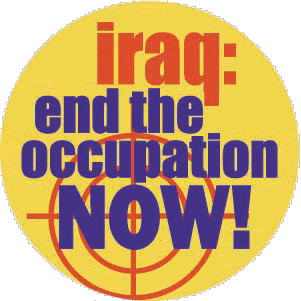
Yesterday was Today isIraq War Moratorium Day. It is a day of national individualized action observed the third Friday of every month. Take the pledge.
It’s hard for me to believe that it’s already been four weeks since the first Iraq War Moratorium Day. The time flew by for me. And perhaps for some of you.
Unfortunately, since then, time has just came to a halt, real and metaphorical, for more victims–civilian and military–of the continued occupation of Iraq and their loved ones .
I realize that many of us are feeling particularly in political despair right now. Every day brings more news of more violence, more injustice, more brutality brought about by the ruthlessness of the Bush “administration.”
But we must continue to resist. To say NO to the ongoing occupation of Iraq.
For weeks, I’ve wanted to write about the event I organized for Iraq War Moratorium Day university where I teach, but I couldn’t figure out how to do so with enough detail without outing myself.
I invited academics, from numerous discipines; an Iraqi writer and poet; an Iraq War vet, now with Iraq Veterans Against the War (IVAW); and an analyst from Human Rights Watch. It wasn’t your usual academic event, more of a “slam.” There was a standing mic, and each speaker had no more than eight minutes to offer up what I called a “critical intervention” on the war.
We didn’t coordinate the interventions beforehand, but it was striking that we all touched on, in different ways the simultaneous visibility and invisibility of the war.
- A number of us remarked on the irony of being a “nation at war” when we are being urged to live life as usual as a very sign that we are “winning” the so-called GWOT.
We see the war on TV, but what do we see? What are we shown? We hear over and over again that we are a nation at war, but at home, everything seems to be just life as usual.
- One of the speakers in particular talked about the proscription on photographs of the returning wardead’s coffins and their funerals–how this effort to control the imagery also makes public, communal mourning more difficult.
- The most powerful invocation of the simultaneous visibility/invisibility of the war was the intervention of Demond Williams, the Iraq War vet and rep of IVAW.
 You may recognize him from the powerful documentary, The Ground Truth
You may recognize him from the powerful documentary, The Ground TruthHe is a gifted public speaker. He began by saying: “This is the last time I’m going to speak about the Iraq War.” And then he went on “The last time I said that …” and he gave a litany of all the times he had said that, and how he is compelled to speak nonetheless, beyond his pain and personal preference. He would rather be silent, to not think about the war every minute of everyday.
He spoke of being traumatized, unable to leave the war behind, unable to reintegrate into life here, despite being actively involved in the peace movement, a Ph.D. program in Sociology, etc. etc.
He spoke honestly, bravely, painfully, about having thoroughly participated in the war, until he saw the light, when he had a conversation with an Iraqi man who was just trying to get to work and who was terrified.
He spoke of his guilt. But he also spoke, with brutal honesty, of missing the sensorium of war. As if the war was the only place he belonged even though he couldn’t bear it. He had been trained to kill, to be violent. He spoke of feeling that violence within him still. He spoke of having no place. He stood there both utterly shattered and utterly composed, commanding a riveted audience.
The war visible/invisible in the flesh.
If Demond Williams can resist day after day, if he can speak out, so can we. We owe it to him, to the rest of the troops to the Iraqis, to our fellow citizens, to the world.
 The other night, feeling politically helpless, I went to a book launch, discussion and signing, featuring “unembedded journalists” Dahr Jamail, author of Beyond the Green Zoneand Jeremy Scahill, author of Blackwater: The Rise of the World’s Most Powerful Mercenary Army. What an incredible event! There’s a lot to write about, but I want to highlight just a couple of things here.
The other night, feeling politically helpless, I went to a book launch, discussion and signing, featuring “unembedded journalists” Dahr Jamail, author of Beyond the Green Zoneand Jeremy Scahill, author of Blackwater: The Rise of the World’s Most Powerful Mercenary Army. What an incredible event! There’s a lot to write about, but I want to highlight just a couple of things here.
Scahill is also a gifted speaker. He began with some ironic anecdotes, and gradually built to a fevered pitch, urging action, that we not sit idly by as the military-industrial complex proliferates violence across the globe. He warned of the even further evil of the privatization of the military function. We’re all familiar with these dangers to democracy, freedom, human rights, and the habitability of the planet.
I was surprised when I heard him say, rather strongly and with near disdain, that blogging and cyber-action do not an anti-war movement make, that the electoral horse race is sapping our attention, that the 2.0 anti-war movement is draining the movement of its vitality. We need more embodied presence to be a truly effective anti-war movement. Mass action and small action. We need to be out there, loud and visible. Every day, in in multiple and various ways.
Astounded by the business-as-usual, politics-as-usual, life-as-usual predominant in these United States, he asked:
Where is the militancy? Where is the resistance?
The suggestion was that our embodied resistance, while not necessarily actually a threat of violence, demonstrates a force that cannot be ignored. He emphasized that cyber-action and calling and writing aren’t enough. We have to lend our bodies and physical voices and presence to the resistance.
Resistance, big and small. Mass action. Little action. Protest. Micro action. All of this adds up to a visible movement of resistance.
Make your resistance to the continuing occupation of Iraq known. Wear a button. Put on a bumper sticker. A lawn sign. A window sign.
Join the eleven city demonstration on October 27th. Sign up at Road2DC to organize the details of your trip, to get inspired, and to make connections.
Scahill introduced Dahr Jamail, in awe of his initiative and courage. He introduced him by quoting priest and life-long peace activist Dan Berrigan’s beautiful strong words in memory of Dorothy Day, founder of The Catholic Worker:
She lived as though the truth were true.
And he urged us to follow Dahr’s example in whatever way, and live as though the truth were true. I took that to mean that we have to inhabit our words, meld thought and action. Make our anti-war sentiment alive, vital, loud, visible.
 Jamail opened by offering gratitudes to some of the people in the audience who were special to him. He choked up when he introduced Salee, a 10 year old Iraqi girl, victim of U.S. bombing, whose life had been saved by those wicked “terrorists” in Fallujah. Please learn her story and watch her videos at the link.
Jamail opened by offering gratitudes to some of the people in the audience who were special to him. He choked up when he introduced Salee, a 10 year old Iraqi girl, victim of U.S. bombing, whose life had been saved by those wicked “terrorists” in Fallujah. Please learn her story and watch her videos at the link.
Salee had been brought to the U.S. by an amazing group No More Victims, founded in September of 2002 by Cole Miller and Vietnam veteran Alan Pogue. Please take a moment to visit the website and perhaps make a contribution of money or time.
Jamail’s reading from his book was powerful. I bought a copy and am still reading it, but the pages are already warped with my dried tears. I am proud to have had him sign it. Likewise, I’m proud to have had my Blackwater signed by Scahill. I did get to ask him if he didn’t see the good side of blogging, wasn’t it the very kind of independent media he’d been stressing the importance of? Yes, he said, of course. It’s of vital importance. But it’s not enough. We need to blog and resist. We need to get out from behind the screen for some embodied activism.
Before bringing this somewhat rambling diary to a close, I want to share a the poem that Jamail read to close his presentation, The Low Road by Marge Piercy:
What can they do
to you? Whatever they want.
They can set you up, they can
bust you, they can break
your fingers, they can
burn your brain with electricity,
blur you with drugs till you
can’t walk, can’t remember, they can
take your child, wall up
your lover. They can do anything
you can’t stop them
from doing. How can you stop
them? Alone, you can fight,
you can refuse, you can
take what revenge you can
but they roll over you.But two people fighting
back to back can cut through
a mob, a snake-dancing file
can break a cordon, an army
can meet an army.Two people can keep each other
sane, can give support, conviction,
love, massage, hope, sex.
Three people are a delegation,
a committee, a wedge. With four
you can play bridge and start
an organization. With six
you can rent a whole house,
eat pie for dinner with no
seconds, and hold a fund raising party.
A dozen make a demonstration.
A hundred fill a hall.
A thousand have solidarity and your own newsletter;
ten thousand, power and your own paper;
a hundred thousand, your own media;
ten million, your own country.It goes on one at a time,
it starts when you care
to act, it starts when you do
it again and they said no,
it starts when you say We
and know you who you mean, and each
day you mean one more.
RESIST. BE VISIBLE. MAKE YOUR VOICE HEARD. 
and that is all she wrote …

14 comments
Skip to comment form
Author
oh. this is also at the orange place.
I’m so hoping this keeps building.
and a shout out to my new friend dharmasyd. She saw my essay from the first IM Day and joined our blog. I met her today! She’s on the far right in green.
Thanks for this essay srkp! Why isn’t this on the front page?
i just finished catching up on work and decided to check out dd before falling out. i had planned to get to one of the jamal/scahill events this week, but wasn’t able to squeeze the time out of school and work. so wish i had. would also have loved to be a part of the event you organized. i agree with scahill and expect you do too since we stood together up at tavern. hope to run into you on the 27th – or better i hope there are so many marchers that we miss each other.
also read your essay about your mother but couldn’t comment then. profoundly beautiful.
that separates the net roots from the fray of the real world. It’s strange as the net has been amazingly affective in counteracting the the propaganda of our pathetic 4th estate. How do we move this empowering medium into the real world, the face to face world of bodies and people. We need to stop thinking were separate.
Arianna Huffington said something that struck me the other night, she said the line between the extreme right and the mainstream has been blurred, it has been assimilated into the mainstream where it sits as acceptable. The only way to break this is to move it from our own Ivory Tower into the world of community.